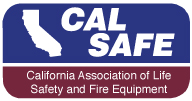Fire Prevention
How to prevent fires from occurring
CLASS 
ORDINARY COMBUSTIBLES
- Keep storage and working areas free of trash.
- Place oily rags in covered containers.
CLASS 
Flammable Liquids or Gases
- Don't refuel gasoline-powered equipment in a confined space, especially in the presence of an open flame such as a furnace or water heater.
- Don't refuel gasoline-powered equipment while it is hot.
- Keep flammable liquids stored in tightly closed, self-closing, spill-proof containers. Pour from storage drums only what you will need.
- Store flammable liquids away from spark-producing sources.
- Use flammable liquids only in well-ventilated areas.
CLASS 
Electrical Equipment
- Look for old wiring, worn insulation and broken electrical fittings.
- Prevent motors from overheating by keeping them clean and in good working order. A spark from a rough-running motor can ignite the oil and dust in it.
- Utility lights should always have some type of wire guard over them. Heat from an uncovered light bulb can easily ignite ordinary combustibles.
- Don't misuse fuses. Never install a fuse rated higher than specified for the circuit.
- Investigate any appliance or electrical equipment that smells strange. Unusual odors can be the first sign of fire.
- Don't overload wall outlets. Two outlets should have not more than two plugs.
CLASS 
Flammable Metals
- Flammable metals such as magnesium and titanium generally take a very hot heat source to ignite. However, once ignited, they are difficult to extinguish as the burning reaction produces sufficient oxygen to support combustion.
- In some cases, covering the burning metal with sand can help contain the heat and sparks from the reaction. Class D extinguishing agents are available and are a more effective solution. If you are planning a project using a flammable metals, you should consider purchasing Class D extinguishers.
- Pure metals such as potassium and sodium react violently (even explosively) with water and some other chemicals and must be handled with care. Generally these metals are stored in sealed containers in a non-reactive liquid to prevent decay (surface oxidation) from contact with moisture in the air.
- White phosphorus is air-reactive and will burn and explode on contact with room air. It must be kept in a sealed container with a non-reactive solution to prevent contact with air.
- Flammable metal reactions are best avoided by completely understanding the properties of these metals and using good judgement and common sense.
CLASS K
- Extinguisher rated to specifically address these commercial "combustible cooking media" fire hazards in kitchens.
